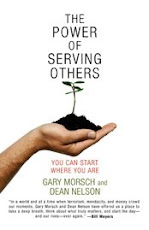I recently took some time to reflect on my professional life. I thought back on my successes and my many failures through the years. As I reflected I wondered what really shaped me a s a professional. Was it my education? Was it my years of experience? Certainly both education and experience played huge roles in my development. However, I realized it was the more than just education and experience. It was all the many people that I have met along my professional journey. Some of the people I met were a great influence in a positive way and there were some that I would rather forget. Now that I am looking back I realize that I myself have often been both of those kind of people. I have influenced some people in positive ways and others would just as soon see me on the side of the road with my car broken down. What causes us to be so different and what will determine our eventual legacy? At the end of my career will I have become someone that has benefitted my fieldof work and those that I have worked with and for.Or will I be added to the long list of bad bosses?
As I reflected on these questions I realized that my education is less of a factor than my experiences. It is my experiences that will benefit me more than most anything else. Those experinces are both personal and professional. My professional experiences are summed up in my interactions with good and bad bosses, employees, customers, meetings, business events, trips, and day to day grinding it out. My personal interactions have been far more frequent and varied. Certainly I have had the same good and bad interactions and experiences. I realized that personal lessons often came much mre mundane and routine interactions than in the professional arena.
Many of the personal lessons came when I was not expecting them. The times when I was young and I helped my father assemble some toy or help out in some household activity. They came by watching my parents work hard every day and come home play tag with us in the yard. It came when I watched my siblings get their first jobs, lose their first jobs, go on their first dates, graduate school, get married have their children. It came when my father gave me the speech about giving more service than you are paid for and then seeing him live up to it. The lessons multiplied when I started to have those sameexperiences for myself. They came when I saw my parents lose their jobs and not know where to turn, but they always knew what to do next, and that was to keep working at raising your family and finding a way to pay the bills. This was always by working. I learned that when times are hard you will put your life back together by working and rendering more service than you are paid to do. I learned that when I did things that were stupid and hurtful to others that I would eventually pay the price for those things. I learned that all things are created that way. You get back what you put in. Do good and you eventually get good in return. Do bad and you will eventually get the bad in return. Even when it doesn't always seem as though that is how it will work out.
I could go on for a long time talking of the different lessons. The real point is that I learned my most valuable lessons right at home. Not in school, college, or graduate school. Not at work, meetings, retreats, or business trips. My greatest lessons come from my roots. Maybe this is the greatest lesson of all, the realizing the importance of my roots. I only hope that I can live up to the lessons and pass them on to my kids. I do hope that they decide to pursue education, but I believe that it would be worthless if they failed to take their roots with them.





